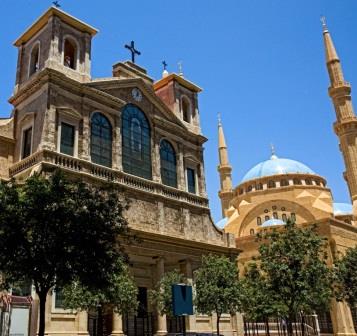
Branden Kartchner
Lebanon’s religious landscape is exceptionally diverse. Muslims compose around 60% of the population, most of which are of the Sunni or Shia branches. Christians make up 39% of the population including Maronite Catholic, Greek Orthodox, Melkite Catholic, Armenian Orthodox, Syrian Catholic, Armenian Catholic, Syrian Orthodox, Roman Catholic Chaldean, Assyrian, Copt, and Protestant. It is important to note that the data may be inaccurate, as the Lebanese government has refused to administer censuses since 1932.
A Lebanese Civil War lasted from 1975 to 1990 was largely based on religious differences. The conflict was between Christian forces seeking to keep the status quo democratic government and Palestinian-Muslim forces attempting to increase the amount of Islamic influence in the state. At one point during the war, the Palestine Liberation Organization infiltrated part of Beirut and was able to operate a virtual independent state within Lebanon. In 1990, a peace deal was brokered and the Christians agreed to lose their majority in Parliament and settle for an equal number of parliamentary seats with the Muslims. In addition, the factions agreed that the president was to be a Maronite Christian, the prime minister a Sunni Muslim, and the speaker of Parliament a Shiite Muslim.
The Lebanese constitution guarantees freedom of opinion and freedom of conscience. It also grants all religions equal respect and treatment. Lebanon has openly welcomed refugees fleeing from religious persecution. The government requires the registration of religious groups and the government does not discriminate in the process. However, some allege that the government’s religious-based quota system for public jobs is discriminatory.
The government allows religious groups to administer their own form of family law including marriage, divorce, child custody, and inheritance disputes. There is no governmental ban on proselytizing, but cultural interaction is largely defined by religion.
Sectarian violence has been a problem in Lebanon. Recently, the extremist Shia group Hezbollah has been trying to insert more Islamic influence in society. Due to Israel’s occupation of Lebanon during the Lebanese Civil War, acts of anti-Semitism have been very commonplace. In 2013, a leading Hezbollah cleric called for the eradication of the Jewish state. The Syrian conflict has spilled over into Lebanon and Shia factions supporting Assad in Syria openly fight with supporters of the Syrian rebels. As a result of the political discord, shootings and bombings have occurred throughout Lebanon.
Sources: Religion and the State: An International Analysis of Roles and Relationships; US Department of State International Religious Freedom Report 2013